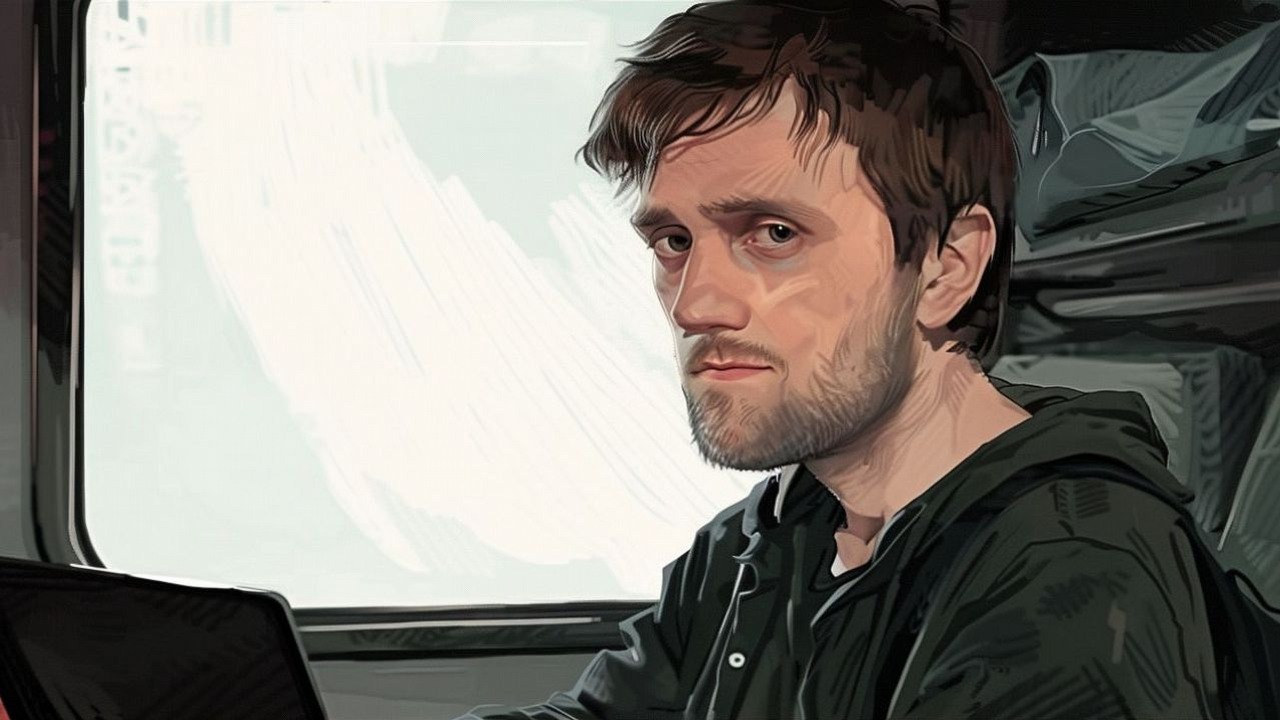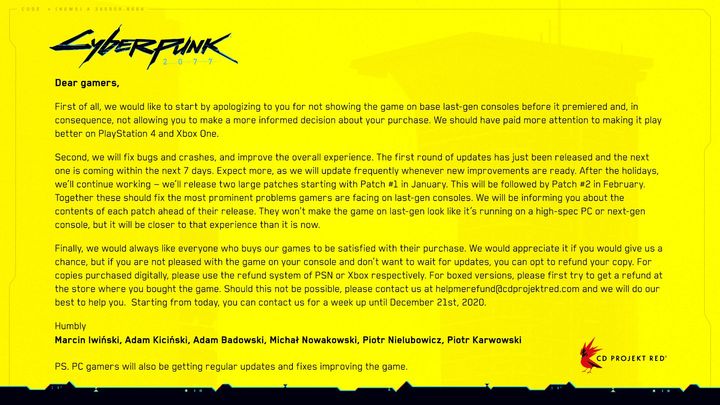Monetization of Apologies and Roadmap of Penance - How Do You Make Money on Mistakes After Failed Game Launch?
Apologies after a failed launch are nothing unusual nowadays and have even become a way to monetize and fuel the interest of angry players. Here's how a game development roadmap turns into a roadmap of atonement. And we are simply falling for these gestures.

We know it all too well. First beautiful words, empty promises, and pie in the sky. Pure disappointment. Then the ritual of pouring ashes on one's head and public self-flagellation. We apologize, it turned out poorly, we were unaware it would be this way, we didn't foresee it, everything was supposed to look different, and we had good intentions. We let you down. But don't write this game off, as our journey to redemption begins.
In the beginning, there was hype. A period of nurturing interest that can last for several months or even years. This is a normal and necessary stage of developing and releasing a game - preparing a group of recipients and securing future capital. Publishers are going to great lengths in their communications about this one and only game, which is intended to offer a new kind of EXPERIENCE. Smooth, beautiful sentences, polished screenshots, and directed trailers promise experiences that will give us chills on our backs and blushes on our faces. Pearly smiles, cleverly incorporated jokes in presentations, and communication based on the assurance that everything we do is for the players.
At the same time, gamers keep track of the publishing process, creating hundreds of threads in which they outdo each other with opinions and theories about the game. They come up with many ideas and wonder what they will find in a given title. They dream beautifully, by the way - I enjoy reading early-release threads about hopes because it's a sociological phenomenon. Aware of this, publishers host monthly developer's diary - podcast meetings with devs sitting in chairs and discussing the wonderful experience we are about to get. What the developers don't manage to promise, the fans will fill in for themselves.
Then the premiere comes and a storm is unleashed. Players, for whom this amazing experience turns out to be not so amazing, flood the internet with threads, shouting about failure, scandal, theft, and fraud. There's also a review bombing, and even - in radical, treatment-requiring cases - threats and stalking. The publisher doesn't know what to say and sinks into the ground - a short period of silence follows. In the silence, the disappointed crowd demolishes the stage the publishers had been building so meticulously for months.
But everyone is already waiting for that special message, and it's bound to appear. You can count on it. Hope flourishes beautifully amidst the post-premiere ruins. Because this is already a typical stage of game release - apologies. One of the textbook chapters about gaming PR and the publishing process should address the stage of apologizing and regretting mistakes.

Yellow boards, tweets, announcement on Discord. Sad posts on social media. The forms may differ, but the message is consistent - it didn't go as we wanted for various reasons, and now we apologize. Now we announce changes. Now it will be different. Now we will show what we are really capable of.
Today, games have two or even three premieres. The first is the one after which an angry crowd storms the developers' offices, demanding justice. The second takes place a few months later when major patches bring a particular title to a state that meets the expectations of angry players. There is talk of Cyberpunk 2.0 - and I'm not referring to the game that will be developed in a few years, but rather the old Cyberpunk 2077 and the Phantom Liberty expansion. There is also talk of No Man's Sky 2.0, Diablo 4 2.0., and previously about Diablo 3 2.0.
Roadmap of penance
Today's service games come with game development roadmaps, but equally often we may encounter something even more absurd: a roadmap of apology, a roadmap of repair and reconstruction - precisely a roadmap of penance. It's a path to rebuild both the game and the players' trust. Modern gamedev can sometimes feel like a spiral of madness: starting with smiles, then tears, and a strong determination to do better. It's all planned for months of updates and boosting player interest, as if the game hasn't been released yet and as if we haven't just gone through a massive meltdown. This is a brilliant way to monetize mistakes, incompetence, and blunders - we screwed up, but now watch, now witness, and participate in our repentance. We were unable to handle it alone, but now, now, gosh, we are smarter and we invite you to help us - help us fix everything, help us comprehend where we went wrong, and we will do it TOGETHER. Therefore, the dev invites players to take part in this pilgrimage of redemption, and they eagerly participate in it. Even when we are upset, even when we are full of rage, instead of walking away and exploring other options, we get caught up in it and engage in this peculiar, not to mention harmful, relationship. Hotfixes are developed based on feedback, often focusing first on the bugs that aren't necessarily critical but are the most common - this will result in comments on Reddit after the patch release saying: "We love u guys! It's obvious that you're listening to us, thank you!"
Reborn and redemption
The game development roadmap outlines the seasons: the first one includes a horse, the second one introduces new quests, and the third one offers the opportunity to buy a house. The penance roadmap for each month describes fixes, mechanic repairs, optimizations, as well as new content (take a look at the roadmap of Millennia). The game's development roadmap smoothly transforms into a roadmap of apologies.
In the case of single-player games, apologies are actually one way to earn extra money. Thanks to the apology roadmap, a single-player game that isn't a service game can transform into one - players are eager to see the updates that are meant to fix the title, curious about the new additions, and interested in the overall presentation of the long-awaited final creation. This is a great way to prolong interest. In theory, a single-player game is expected to experience its peak in popularity at the time of its release, which then gradually fades away. But who wouldn't want to experience such booms regularly with every update and see the player peak on the Steam rise in the following months?
In the "yellow" apologies for Cyberpunk 2077 on old-generation consoles, we read about patches planned for the next few months that will fix the game. We just released a few updates, but the next one is coming in 7 days. Expect more, after the holidays patch #1, and then patch #2 already in February. Then the sentence drops: "We would appreciate it if you would give us a chance."
Two years after its premiere, Fatshark releases a patch for Warhammer Darktide and calls it, ironically, "Path of Redemption." Season 04, which is intended to fix Diablo 4, is called "Loot Reborn." So "reborn," so "redemption" - this is the special policy that we will encounter more and more often, which favors keeping the game alive for many, many months after the release. We are drawn to it because we adore tales of redemption - we love witnessing the phoenix emerge from the ashes.
In the official announcement from Fatshark, we have nice pictures, and detailed bullet points with key changes, and it all sounds as if they were trying to hype their own mistakes. Yes, as if we had forgotten the reason we found ourselves in this situation in the first place. It all works because fans have a short memory, and they are naive for wanting to believe that this time will be different. We want to have fun and play good games, not cry and whine. The hype bubble is growing again - see what's happening on Diablo 4 Reddit page - there are already voices predicting that season 04 will finally be the REAL Diablo because the developers have listened to us, the developers have based the changes on the player's feedback. We, who have been invited to this public penance, wholeheartedly embrace it.
Monetization of fuckups, mistakes, oversights, and fixes, because after all, each of these "we are very sorry patches" is an opportunity for a message, news, and encouragement to buy the game. Furthermore, updating the in-game shop to further encourage those pilgrims (players) to invest in skins. A penalty roadmap is a way to sell a game when the launch falls short. "Yes, I made a mistake, but do you think, man, that I made this mistake for free?" "And you think I'm going to fix it for free now?" - may say a developer if it weren't for the fact that PR advises to show humility.
It's not something groundbreaking, not something sensational - but it's important to realize, before writing a forgiving post on Reddit, that all of this has been planned, and we are just small parts in this crazy money-making machine.
0

Author: Matthias Pawlikowski
The editor-in-chief of Gamepressure.com, associated with the site since the end of 2016. Initially, he worked in the guides department, and later he managed it, eventually becoming the editor-in-chief of Gamepressure, an English-language project aimed at the West, before finally taking on his current role. In the past, a reviewer and literary critic, he published works on literature, culture, and even theater in many humanities journals and portals, including the monthly Znak or Popmoderna. He studied literary criticism and literature at the Jagiellonian University. Likes old games, city-builders and RPGs, including Japanese ones. Spends a huge amount of money on computer parts. Apart from work and games, he trains tennis and occasionally volunteers for the Peace Patrol of the Great Orchestra of Christmas Charity.
Latest News
- End of remote work and 60 hours a week. Demo of Naughty Dog's new game was born amid a crunch atmosphere
- She's the new Lara Croft, but she still lives in fear. Trauma after Perfect Dark changed the actress' approach to the industry
- „A lot has become lost in translation.” Swen Vincke suggests that the scandal surrounding Divinity is a big misunderstanding
- Stuck in development limbo for years, ARK 2 is now planned for 2028
- Few people know about it, but it's an RPG mixing Dark Souls and NieR that has received excellent reviews on Steam, and its first DLC will be released soon

